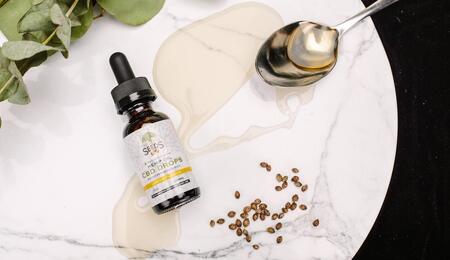CBD Could Inhibit Virus Replication in Human Lung Cells

There's vast potential with CBD. This non-intoxicating compound of cannabis already has multiple medical applications. New medical research reveals it could also preserve lung health.
After a year of mental exhaustion from the COVID-19, discovering new hobbies and reinventing ourselves, we have some good news, and they are related to cannabis trials.
Scientists from all over the world are working day and night to provide more efficient solutions in the treatment of virus infections.
Since the beginning of the pandemic, Canadian scientists were first to discover that certain strains can help in the war against coronavirus.
Israel is now the leading country regarding vaccination, but they were also on top of clinical trials with CBD, estimating that CBD treatment can help patients who are in life-threatening conditions.
This time Americans took the stage. Namely, Marsha Rosner from the University of Chicago in Illinois and colleagues deepened the study of cannabidiol (CBD) and its metabolite 7-OH-CBD that has the potential to block SARS-CoV-2 replication in lung epithelial cells. Those are like barrier cells that line the organ's surface, and their functions include moistening and protecting from pathogenic invasions.
CBD was found to suppress viral gene expression and hold back the numerous consequences of the virus on the host gene transcription. Moreover, the compound appears to influence the expression of interferons, which are critical cell signaling proteins generated by host cells as an early response to viral invasion. It is important here that the rate of SARS-CoV-2 infection in a group of patients treated with CBD was lower than the matched patients who were not taking the CBD.
As Rosner and the team write, "this study highlights CBD, and its active metabolite, 7-OH-CBD, as potential preventative agents and therapeutic treatments for SARS-CoV-2 at early stages of infection."
Alternative approaches
We know a lot more now than last year. Nevertheless, we are dealing with tragic numbers since COVID-19 shocked the world, starting in Wuhan and leading to 119.5 million infections and causing more than 2.64 million deaths.
Although many countries have launched massive vaccination campaigns, the virus has not lost the intensity. This is why Rosner and colleagues insist on other possibilities, especially emphasizing people in developing countries who have no privileged approach to vaccines.

What is actually new now?
For the effects of the CBD on SARS-CoV-2 replication, the researchers pretreated a type of human lung carcinoma cells expressing ACE-2 (A549-ACE2) with 0-10μM CBD for 2 hours before infecting them with the virus. Lab analyses, two days later, resulted in favor of CBD, and the researchers were quite amazed by the potent agent that blocked viral replication in the cells.
What exactly happened? The scientists explained that RNA sequencing of infected A549-ACE2 cells, using CBD for one day, had shown a notable regression of SARS-CoV-2-induced changes in gene expression. In other words, CBD quite successfully terminated the viral RNA expression, including RNA coding for the spike protein. Furthermore, the analyses of the host cell RNA revealed that the differences that were actuated by the virus were not only conversed, but they also have similarities with the cells treated with CBD alone.
Encouraging results
The trial then proceeded to treat 82 patients with CBD, who were previously tested with SARS-C0V-2, and they were compared with patients that were not given CBD.
The results were impressive! The percent of SARS-CoV-2 was only 1.2% in the group of patients that were using CBD, in contrast to 12.2%, among the matched patients not treated with CBD.
“We advocate carefully designed placebo-controlled clinical trials with known concentrations and highly-characterized formulations in order to define CBD’s role in preventing and treating early SARS-CoV-2 infection,” Rosner and the colleagues concluded.
The study, which is due to be peer-reviewed, has been at the moment made available on bioRxiv, which publishes preliminary scientific reports.



